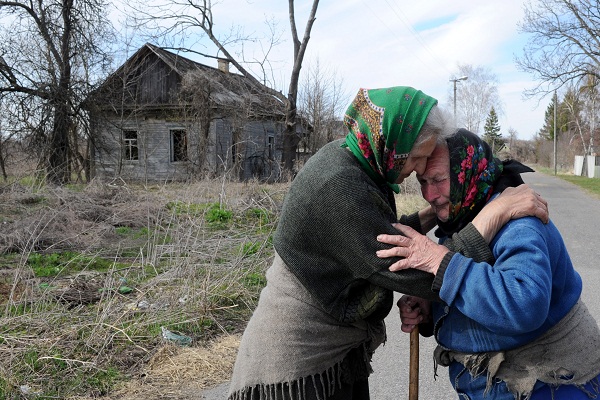‘Village’, to most middle-Englanders, conjures up a cosy, living community. Perhaps the post office is threatened with closure or the bus timetable is to be cut, but the hanging baskets continue to be tended, the village green still hosts games of cricket, there are moneyed retirees or commuters eager to buy the houses. It is not like that, of course, in much of Britain’s Celtic fringe, and even less so in Europe’s more remote peasant communities. Political, social and economic change has drained many villages of their people, and only the old remain. Tom Pow visits one in Spain where the youngest inhabitant is seventy, and the sad conclusion of his book In Another World is that many villages ‘have only ten years of life left in them’.
‘Memory, home, love lost and mourned, elegy, earth and stone’ ‒ these are, Pow reminds his readers, ‘the materials of which I have always made my poems and stories’. This volume, mostly a travel book, but illustrated with the author’s black-and-white photographs, his poems and some short stories, is indeed an elegy for the dying rural communities of Europe ‒ but it is by no means a catalogue of doom and gloom. Pow celebrates what he calls the ‘taskscape’ (the landscape created by peasant agriculture); he encounters on his travels a number of doughty individuals who are swimming against the tide ‒ a Russian priest, a Highland road builder; and he explores the pull which village life continues to exert, on Spanish villagers who have left but still return in the summer and pay for their church’s new roof, and on all of us for whom the village represents a lost Eden and who feel ‘a nostalgia for a rooted sense of community and fellow feeling’.
The book’s three parts concentrate on the Omaña region of north-west Spain, the Auvergne and northern Russia, but Pow’s exploration of memory, identity, loss and survival ranges widely across Europe ‒ to southern Italy, Bulgaria, the Highlands and Islands, the West of Ireland. The core of the book is an account of Pow’s travel through these places ‒ the people he meets, the stories they tell him, the land they inhabit and farm. But he is always ready for a digression, into history (the Spanish Civil War, the collapse of the Soviet Union, the Highland clearances) or literature (Laurie Lee, John Berger, Roger Deakin, to list but three of the better-known names ‒ and there is a useful bibliography). The smallest thing can set off a new train of thought: the sight of a few empty bottles left in a niche in a half-deserted Italian mountain village moves him to a fascinating discussion of still-life painting.
Pow is a poet, and he brings to the book a poet’s sensibility and feeling for language. He is always a pleasure to read. His attitude to what is, after all, an extremely significant issue for many parts of Europe today ‒ a social issue, but an environmental one too, for if the village dies so too will the ‘taskscape’ that surrounds it ‒ is essentially neutral. He does not mourn, or suggest solutions, he simply observes. But he does have an acute ear for the telling moment, as when one old Spanish villager asks, ‘Who will look after our graves when we are gone?’
In Another World: among Europe’s Dying Villages by Tom Pow (Polygon, £12)






Comments